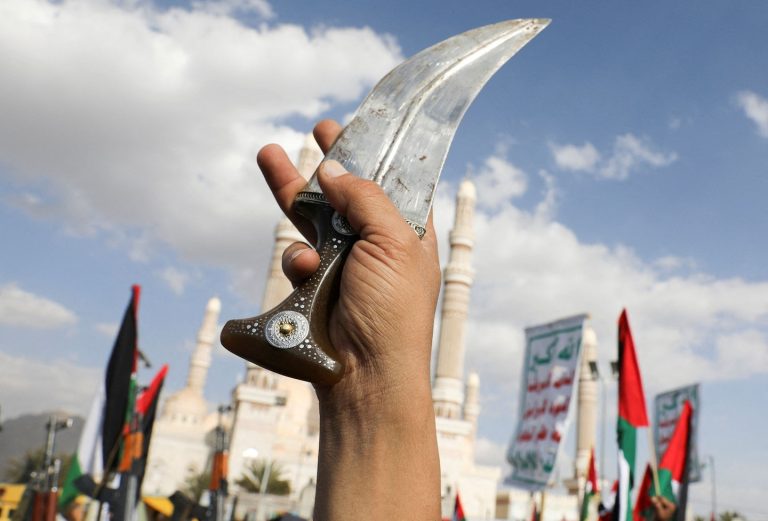But a large segment of global shipping still avoids the Red Sea crossing points that are within range of Houthi attacks. It seems that the Houthis themselves have not bowed down after the attacks by the US-led coalition. At marches held over the weekend in the Yemeni capital, Sanaa, Houthi supporters were reported to have chanted: “We don’t care and we are making it a world war.” On Monday, the Houthis struck a US-owned and operated container ship in the Gulf of Aden.
The Houthis, officially known as Ansar Allah, or “Ansar Allah”, are a rebel movement that took control of Sanaa in 2014. Their tenuous ideological and tactical links with Iran's theocratic regime have grown thicker in the years since, as Yemen has collapsed under the weight of war. A brutal civil war that saw the Houthis mostly fend off a Saudi-UAE-led coalition that was also armed and backed by the United States.
While ordinary Yemenis still face economic collapse and a sprawling humanitarian catastrophe, the Houthis control large swaths of the country, actively threaten their Gulf neighbors with missile and drone strikes, and can project their power over one of the world's most strategic sea lanes.
Analysts assert that this new phase of hostilities may strengthen the Houthis, rather than weaken them. Following the terrorist attack by the Palestinian group Hamas on southern Israel on October 7, Israel launched an operation unprecedented in its scale and ferocity, reducing much of Gaza to rubble, killing more than 23,000 people and wounding residents Gaza in poverty. The Houthis are part of the so-called “Axis of Resistance,” a network of armed groups allied with Iran across the Middle East. While militias such as Lebanon's Hezbollah appear to want to avoid direct escalation with Israel, the Houthis have thrust themselves into the spotlight by donning the mantle of the Palestinian cause. They insist that their actions in the Red Sea will stop when Israel stops its bombing.
“They are getting what they want, which is to emerge as the boldest regional player when it comes to confronting the international coalition, which is largely pro-Israel and does not care about the people in Gaza,” Laurent Bonnefoy, a researcher who studies Yemen at Sciences Po in Paris, told my colleagues. “This generates a form of support for them, at the international level as well as internally.”
Sympathy for the Palestinians transcends the internal conflict and rivalries that divide Yemen, and so the Houthis are garnering some goodwill even from Yemenis who do not support them. Moreover, even their declared enemies, including the governments of Saudi Arabia and the United Arab Emirates, have avoided endorsing the recent US-led campaign against the Houthis, warning of escalation. The Houthis' ability to now withstand international air strikes is another feather in their cap.
“I think they dream of the Americans or the Israelis attacking them, because that would turn them into a real ‘resistance’ force,” Mustafa Numan, a Yemeni analyst, writer and former diplomat, said at a news conference at Chatham House in December. At a time when Western powers were focusing more on defensive actions in the Red Sea.
The Houthis have long adapted to being in the crosshairs of foreign powers. It is unclear how willing the United States and Britain, the other major Western power that participated in last week's strikes, are to launch a coordinated campaign to further reduce the capabilities of the Houthis.
“The Houthis may be calculating that, having withstood seven years of Saudi aerial bombardment over the course of the Yemeni civil war, a US air attack on Yemeni targets is unlikely to inflict further significant damage or that any damage to their equipment or facilities would result in to exacerbate these damages. They cannot be repaired or replaced quickly, noted Gerald Feierstein, a former US ambassador to Yemen.
“Moreover, a US (or other) attack on Houthi military targets would confirm, from the Houthis’ perspective, the validity of their propaganda that they are fighting on the front lines in support of the Palestinians and that their operations succeed in threatening the interests of the United States and its allies.” he added.
In fact, the Gaza war and its aftermath, as the International Crisis Group noted, “provided the Houthis with an opportunity to deflect mounting popular pressure over their governance practices in areas under their control, and enabled them to suppress opposition to their rule through arrests.” Opponents in those areas on charges of collusion with Israel and the United States.”
In Washington, analysts from across the political spectrum question the Biden administration's strategy regarding the Houthis. Hawks derided the limited approach of the current campaign, which Eliot Cohen of the Center for Strategic and International Studies described as the “remedial bombing” that emerged last week, and which may do little in the long term to weaken or disband the Houthis.
“Replacing people is more difficult than replacing things, and instilling fear is more effective than dreaming of deterrence,” Cohen said, calling for strikes that killed more Houthi members as well as Iranian agents and allies.
After Houthi attacks on shipping targets continued this week, Ben Friedman, policy director at Defense Priorities, a think tank that advocates for restraint in US foreign policy, said: He sighed in frustration. The Biden administration “is no longer deciding whether to retreat and appear helpless, or to escalate in vain.” He added: “The only way out of this is diplomacy.”

